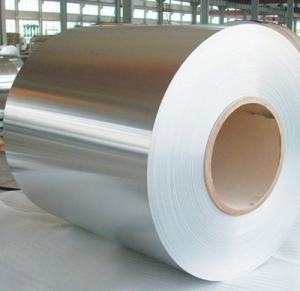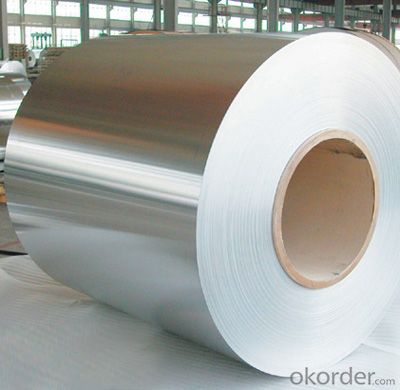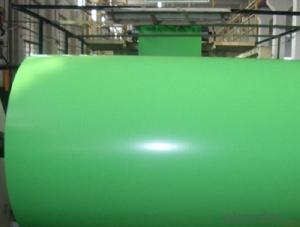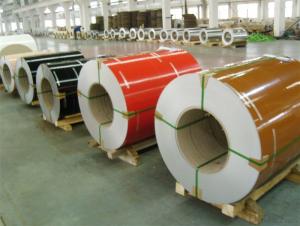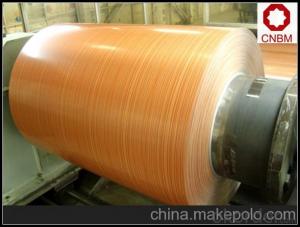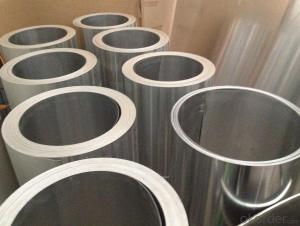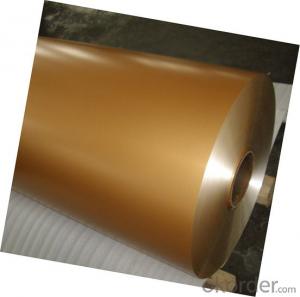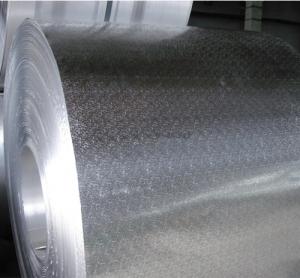Stucco Embossed Mill Finished Aluminum Coils and Sheets from China
- Loading Port:
- Shanghai
- Payment Terms:
- TT or LC
- Min Order Qty:
- 5 m.t.
- Supply Capability:
- 9000 m.t./month
OKorder Service Pledge
OKorder Financial Service
You Might Also Like
1.Structure of Aluminum Sheet with PE Film :
Mill Finished Aluminum Coil is designed for many field such as electronics, instruments, lighting decoration, packing industry, and house decoration, curtain wall, honeycomb-core panel, sandwich panel, aluminum composite panel, aluminum composite pipe etc.. Mill finished aluminum coil for is hard and everlasting under the blazing sun. You can choose the alloys as your habitation and we will do our best to meet your requests.
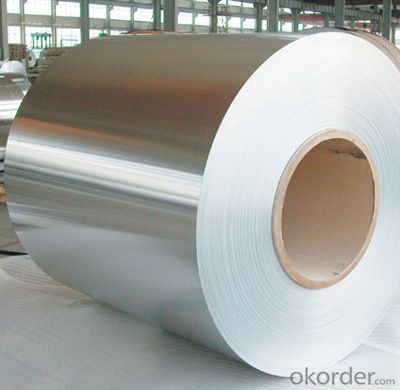
2.Main Features of the Aluminum Sheet with PE Film :
• Smooth surface
• High manufacturing accuracy
• High strength of extension and yield
• Well packaged
• No marks, no scratch, no excessive oil
3. Aluminum Sheet with PE Film
| Alloy: | AA1050, 1060, 1070, 1100, 3003, 3004, 3005, 3105, 5052, 5083, 5754, 8011, 8006 |
| Temper: | H14, H16, H18, H22, H24, H26, H32, O/F |
| Thickness: | 0.2-100mm |
| Width: | 30mm-1700mm |
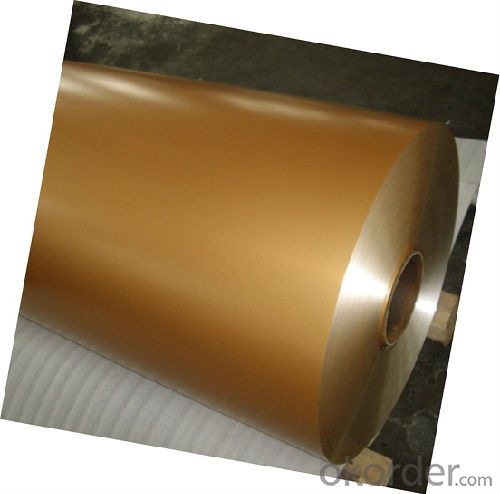
4.FAQ
We have organized several common questions for our clients,may help you sincerely:
① How about your company?
A world class manufacturer & supplier of aluminum coil and alloy blanks. Aluminum production base is comprised of 18 aluminum annealers, 10 coil and foil mills, 4 continuous production lines, 2 hot rolling production line and 3 prepainted lines.
Export 5000 tons per month to Asia, America and Middle East. Always do the best for our clients.
②Can you guarantee the quality of the products?
We are responsible for the quality of materials to get a long-term cooperation with clients in a reasonable period of time and we are glad to arrange and coordinate any third party inspection for you.
③What is the delivery time after purchase?
35 day after receiving client’s deposit or correct LC
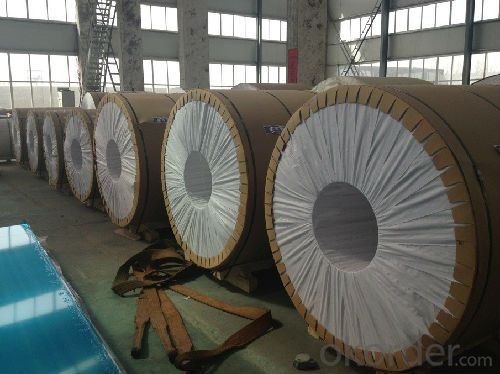
- Q: What are the potential applications of coil-embossed aluminum coils?
- Some potential applications of coil-embossed aluminum coils include building and construction materials, such as roofing and siding, as well as decorative elements for interior design. Additionally, these coils can be used in the manufacturing of appliances, automotive parts, and packaging materials, due to their durability, aesthetics, and corrosion resistance.
- Q: This question asks for the distinctions between two types of metal coils: aluminum and iron.
- <p>Aluminum coil and iron coil differ in several aspects. Aluminum coil is lightweight, corrosion-resistant, and has good electrical conductivity, making it ideal for applications like electrical wiring and packaging. Iron coil, on the other hand, is heavier, stronger, and more magnetic, commonly used in construction and manufacturing for reinforcement and structural support. Additionally, iron is more prone to rust compared to aluminum, which is more resistant to corrosion. The cost and availability of these materials also vary, with aluminum being more abundant and less expensive than iron.</p>
- Q: I don't have a rounded baking tray at the moment and would like to replace it with aluminium foil, do you think it's suitable and that it can withheld the intensity?
- Cheesecake batter is dense. An aluminium tray may not be stiff enough to retain the proposed shape of your cake. Test the pan; load it to the top with water. If it doesn't collapse your cheese cake will not either. You could try using two trays nestled together. You also may need to load the cake and tray on a flat tray when you move it around. Use a thermometer to know when the cake should be pulled. Cook's suggests the top limit at 150 degrees F. Do grease the sides of the pan. Be sure to loosen the cake from the pan side after it is out of the oven. I bake my cakes at 500 degrees F. for ten or twelve minutes, and then to the 150 degree F point at 200 degrees F. Do not open the oven or try to cool it down. Simply dial down the thermostat. If the cake looks too brown cover it with a piece of aluminium foil. Have fun! Avoid cracks...don't overcook the cake!
- Q: How are aluminum coils used in the automotive industry?
- Due to their numerous advantages over traditional materials, aluminum coils play a crucial role in the automotive industry. They are widely used in various parts and components of vehicles, enhancing performance, improving fuel efficiency, and reducing overall weight. A primary application of aluminum coils in the automotive industry is in the manufacturing of heat exchangers, such as radiators and condensers. Aluminum's excellent thermal conductivity enables efficient heat transfer, regulating engine temperature and optimizing performance. By incorporating aluminum coils in heat exchangers, vehicles can achieve better cooling efficiency, preventing engine overheating and maintaining optimal operating conditions. Furthermore, aluminum coils are utilized in the production of air conditioning systems, specifically in the condenser and evaporator units. These coils have excellent heat exchange capabilities, enabling efficient cooling or heating of the vehicle's interior. As a result, vehicles equipped with aluminum coil-based air conditioning systems can provide a comfortable environment for passengers while minimizing energy consumption. Moreover, aluminum coils are used in constructing lightweight body panels and structural components like doors, hoods, roofs, and chassis. Aluminum's high strength-to-weight ratio makes it ideal for reducing vehicle weight without compromising structural integrity. This weight reduction leads to improved fuel efficiency, reduced emissions, and enhanced performance in acceleration, handling, and braking. Additionally, aluminum coils find application in producing electrical systems in automobiles. Their excellent electrical conductivity makes them suitable for wiring harnesses, connectors, and other electrical components. The use of aluminum coils in these systems ensures efficient transmission of electrical signals and reduces overall vehicle weight, contributing to improved fuel economy. In conclusion, aluminum coils are extensively used in the automotive industry for various purposes, including heat exchangers, air conditioning systems, body panels, and electrical components. The exceptional properties of aluminum, such as thermal conductivity, strength-to-weight ratio, and electrical conductivity, enable automakers to produce lighter, more efficient, and environmentally friendly vehicles.
- Q: Are there any specific regulations for the transportation of aluminum coils?
- The transportation of aluminum coils is subject to specific regulations aimed at guaranteeing their safe handling and transport in order to prevent any accidents or damage. These regulations encompass various key requirements: 1. Packaging: To avoid any shifting, damage, or falling during transportation, aluminum coils must be securely packaged in appropriate containers. This may involve the utilization of strapping, banding, or shrink-wrapping techniques. 2. Weight limitations: Depending on the mode of transportation employed, there are weight restrictions in place for the transportation of aluminum coils. These limitations are implemented to ensure the stability and safety of the vehicle during transit. 3. Loading and unloading procedures: It is essential to follow proper loading and unloading procedures to minimize the risk of coil damage and to ensure worker safety. This may necessitate the use of specialized equipment like cranes or forklifts. 4. Regulations for hazardous materials: In certain instances, aluminum coils may be considered hazardous materials due to their flammability or other characteristics. In such cases, additional regulations and requirements may be applicable, such as appropriate labeling, documentation, and handling procedures. 5. Transportation permits: Depending on the size, weight, and destination of the aluminum coils, specific permits or licenses may be necessary for their transportation. These permits ensure compliance with local, state, and federal regulations. It is crucial for companies involved in the transportation of aluminum coils to possess awareness of and adhere to these regulations to ensure the secure and efficient transport of the coils. Failure to comply with these regulations can result in fines, penalties, or even legal ramifications.
- Q: Are there any limitations on the anodizing of aluminum coils?
- Yes, there are certain limitations on the anodizing of aluminum coils. Firstly, the size and weight of the aluminum coils can impose limitations. Anodizing is typically done in tanks or baths, so the size of the coil must fit within the capacity of the tank. Additionally, larger and heavier coils may require specialized equipment or processes to ensure proper anodizing. Secondly, the alloy composition of the aluminum coils can affect the anodizing process. Different aluminum alloys have varying levels of response to anodizing, and some alloys may not anodize as well as others. It is important to consider the alloy composition and consult with experts to determine the suitability and potential limitations of anodizing specific aluminum coils. Thirdly, the surface condition of the coils can impact the quality of anodizing. Any imperfections such as scratches, dents, or surface contaminants can affect the evenness and consistency of the anodized layer. It is essential to ensure that the coils are properly cleaned and prepared before anodizing to achieve desired results. Lastly, certain design features or complex shapes of the aluminum coils can pose limitations on anodizing. Anodizing involves the immersion of the coil in an electrolyte solution, and intricate designs or complex shapes may make it challenging to achieve uniform coating thickness. Specialized masking or racking techniques may be required to overcome these limitations. It is important to work closely with anodizing experts or service providers to understand and address any limitations specific to the aluminum coils and achieve the desired anodizing results.
- Q: This question asks for methods to determine whether an aluminum coil is safe for use.
- <p>To determine if your aluminum coil is safe to use, first, check for any visible signs of damage such as cracks, corrosion, or deformation. Ensure that the coil meets the required specifications for your application, including thickness, width, and alloy type. Verify the coil's compliance with safety standards and certifications relevant to your industry, such as ASTM or ISO standards. Test the coil's mechanical properties to ensure it has the necessary strength and ductility. Finally, consider the coil's history and usage; it should not have been exposed to extreme temperatures or corrosive environments that could compromise its integrity. Consulting with a materials expert or conducting a thorough inspection can provide further assurance of the coil's safety.</p>
- Q: What are the common testing methods for aluminum coils?
- Some common testing methods for aluminum coils include visual inspection, dimensional measurements, hardness testing, corrosion resistance testing, tensile strength testing, and conductivity testing. These methods help ensure the quality and performance of aluminum coils in various applications.
- Q: This question seeks advice on methods to prevent rust formation on aluminum coils.
- <p>To prevent rust on aluminum coil, ensure proper storage conditions by keeping the coils dry and avoiding contact with moisture. Use protective coatings or sealants that are compatible with aluminum to create a barrier against the elements. Regularly inspect the coils for signs of corrosion and clean them with a non-abrasive cleaner to remove any contaminants. Avoid using harsh chemicals that could accelerate oxidation. Maintain good ventilation in storage areas to reduce humidity, which can contribute to rust formation. Finally, consider using anodizing or other surface treatments that enhance the aluminum's natural resistance to corrosion.</p>
- Q: Is it possible to utilize an aluminum coil for heating purposes?
- <p>Yes, aluminum coil can be used as a heater. Aluminum is a good conductor of heat, making it suitable for applications where heat transfer is necessary. However, it's important to note that aluminum has a lower melting point compared to other metals like copper or steel, so it's not ideal for high-temperature applications. Aluminum coils are commonly used in electric heaters, such as toasters and air heaters, where they can efficiently transfer heat to the surrounding air or materials. Always ensure that the aluminum coil is used within safe temperature limits to prevent damage or safety hazards.</p>
Send your message to us
Stucco Embossed Mill Finished Aluminum Coils and Sheets from China
- Loading Port:
- Shanghai
- Payment Terms:
- TT or LC
- Min Order Qty:
- 5 m.t.
- Supply Capability:
- 9000 m.t./month
OKorder Service Pledge
OKorder Financial Service
Similar products
Hot products
Hot Searches
Related keywords
